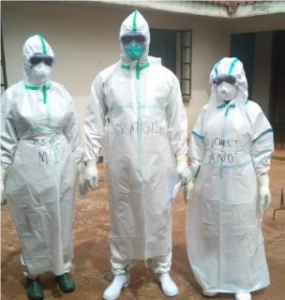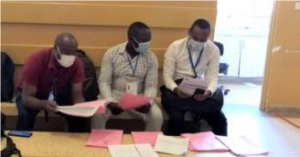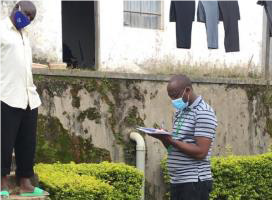 |
Dr. Migisha RichardMBChB (MUST), MPH (MUST), M.Sc. (MUST)Field Epidemiology Fellow (UPHFP) Host Site: Neglected Tropical Diseases (NTD)Host Mentor: David Oguttu and Dr. Mubangizi Alfred |
|||
ABOUT THE FELLOWDr. Migisha is an epidemiologist and holds a Bachelor’s degree in medicine and Surgery, a Master’s degree in Public Health, and a Master’s degree in Science in Physiology. Before joining the Uganda Public Health Fellowship Program (UPHFP), I worked as a medical officer in Kisoro District Local Government, and Ntungamo District Local Government, mainly as a clinician for seven years. I am an alumnus of One Health Institute (OHI) of Makerere University, and I have experience in working with infectious disease outbreaks, and non-communicable diseases. I have published more than 20 scientific papers in the field of disease outbreak investigations, zoonotic diseases, and non-communicable diseases including hypertension, diabetes, and cardiovascular diseases. As a member of the National Rapid Response Team, I have been involved in the national response to the COVID-19 pandemic, including leading three COVID-19 outbreak investigations in different parts of the country. Achievements at the Host Site
Summary of Epidemiological Study:Title: Psychological Impact of COVID-19 on Healthcare Workers in Referral Hospitals During the Early Phase of the Pandemic, Uganda Background: Safeguarding the psychological well-being of healthcare workers (HCWs) is crucial to ensuring sustainability and quality of healthcare services. During the COVID-19 pandemic, HCWs working in COVID-19 treatment units may be subject to excessive mental stress. We assessed the risk perception and immediate psychological state of HCWs early in the pandemic in referral hospitals involved in the management of COVID-19 patients in Uganda. Methods: We distributed paper-based, self-administered questionnaires to HCWs in five referral hospitals from April 20–May 22, 2020. The questionnaire included questions on socio-demographics, occupational behaviors, potential perceived risks, and psychological distress. We assessed risk perception towards COVID-19 using 27 concern statements with a four-point Likert scale. We defined psychological distress as a total score >12 from the 12-item Goldberg’s General Health Questionnaire (GHQ-12). We used modified Poisson regression to identify factors associated with psychological distress Results: Among 335 HCWs who received questionnaires, 328 (98%) responded. Respondents’ mean age was 36 (range 18-59) years; 172 (52%) were male. The median duration of professional experience was eight (range 1-35) years; 208 (63%) worked more than 40 hours per week; 116 (35%) were nurses, 52 (14%) doctors, 30 (9%) clinical officers, and 86 (26%) support staff. One hundred and forty-four (44%) had a GHQ-12 score >12. The most common concerns reported included fear of infection at the workplace (81%) and if a colleague contracted COVID-19 (89%), stigma from colleagues (79%), lack of workplace support (63%), and inadequate availability of personal protective equipment (PPE) (56%). In multivariable analysis, moderate (adjusted prevalence ratio, [aPR]=2.2, 95% confidence interval [CI]: 1.2–4.0) and high (aPR=3.8, 95% CI: 2.0–7.0) risk perception towards COVID-19 (compared with low-risk perception) were associated with psychological distress. Conclusion: Forty-four percent of HCWs surveyed in hospitals treating COVID-19 patients during the early COVID-19 epidemic in Uganda reported psychological distress related to fear of infection, stigma, and inadequate PPE. Higher perceived personal risk towards COVID-19 was associated with increased psychological distress. To optimize patient care during the pandemic and future outbreaks, workplace management may consider identifying and addressing HCW concerns, ensuring sufficient PPE and training, and reducing infection-associated stigma. Key lessons learnt during the fellowship
Next Stepshope to share the skills and competences gained during the fellowship with the aim of improving public health practice in Uganda.I hope to further my career in field epidemiology. Pictorial
|
||||
Sign in
Sign in
Recover your password.
A password will be e-mailed to you.



